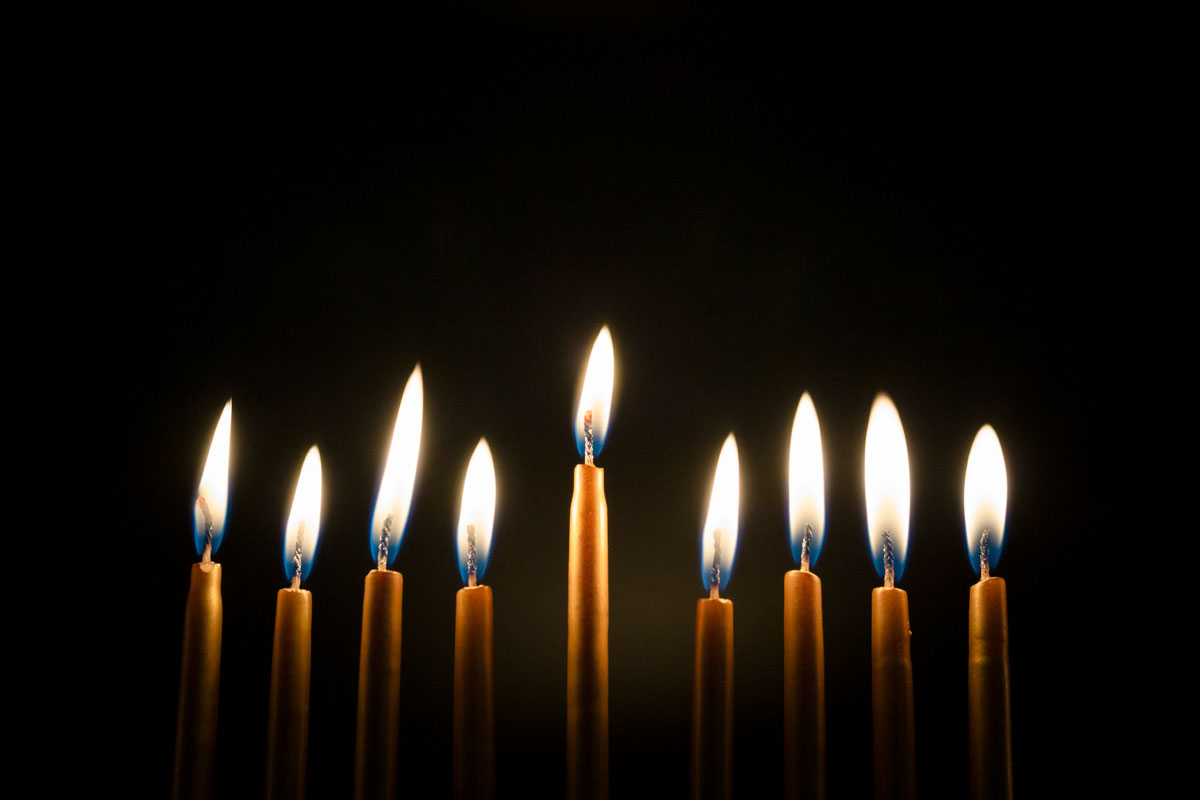It was a Tuesday night in 2019, the third night of Hanukkah and Christmas Eve. After spending the evening with my brother and his wife, my husband and I had headed home to put my 2-year-old son to bed. As I closed my son’s bedroom door for the night, I noticed a vibration on my Apple watch. I glanced down at my wrist and immediately recognized the number on my watch face.
It was my dad’s nursing home, calling to let me know that my dad passed away.
This wasn’t an unexpected death. My dad had been in hospice care for the last four weeks with heart failure and had recently stopped eating and drinking. I knew his death was imminent. I just didn’t know it would fall on two very special holidays for my interfaith family.
The next day, Christmas Day, was more like an out-of-body experience than a family gathering. We spent the day with my husband’s family. I watched my son and his cousins rip open presents with huge smiles on their faces. I watched my in-laws laugh and dance and eat, while I intermittently snuck away to speak with my rabbi and make funeral arrangements. It was a cognitive dissonance of epic proportions.
Hanukkah and Christmas are two of the most joyful holidays in our society. The food, the music, the lights, the presents — they’re all expertly designed to bring joy and warmth and love to families around the world. Just not for me, not anymore. How was I supposed to celebrate these holidays ever again when they made me feel more like Wednesday Addams than Buddy the Elf?
As the third holiday season without my dad approaches, I decided it was time to start taking some of my own advice. Having spent years in the field of mental health, I’ve slowly learned how to find my own joy, even through the sorrow.
I’m not alone in my grief
Sure, the timing of my dad’s yahrzeit might take the cake in terms of its effect on my holiday season, but many people strongly feel the loss of their loved ones during major holidays. In fact, a survey by the American Psychological Association uncovered data about the holiday blues. While the majority of people in the survey reported feelings of happiness, love and high spirits during this time of year, those emotions were often accompanied by fatigue, stress, irritability and sadness. In fact, any issue that a person has with their family members will usually come to the surface during a holiday — whether it’s dysfunction, addiction, abuse, disconnection, estrangement, divorce or loss. Once I stopped imagining how the holidays should be, I gave myself permission to experience them the way they were meant to be.
I make space for grief
One of the toughest parts about grief is how it hits in unexpected waves. One moment I’m driving in my car, singing along to the radio, and the next moment I’m pulling the car over because a song lyric triggered a memory and I can’t seem to turn off the faucets in my eyes. This ongoing oscillation between feeling well and feeling awful is jarring and uncomfortable. Grief can seem like a wild animal that’s impossible to domesticate. As a result, many people cope by avoiding the thought of loss altogether, especially during the holidays. However, too much avoidance can lead to unhealthy lifestyle choices, like overeating, over-drinking or misplacing negative emotions onto the living. It’s important to make space for grief, especially during the holidays.
But how much space is enough? That’s up to the individual. Some people make a physical place setting at the dinner table for their lost loved ones. I make space by writing my dad letters, sharing what’s new in my life and telling him news that would make him feel proud of me. It gives me a chance to slow down during busy times, reflect and find comfort in his memory.
I still bring my dad with me to the holidays
Okay, not literally. But in my house, we now make a big deal out of the third night of Hanukkah. When the sun goes down, we light the menorah and turn up the music. I made a special playlist filled with my dad’s favorite artists — Frank Sinatra, Sammy Davis Jr., The Beatles and Simon and Garfunkel, to name a few. Dinner is a strange concoction of my dad’s favorite foods: Caesar salad, matzah ball soup and chocolate peanut butter ice cream. I show my son pictures and videos of my dad and of the two of them together, and we talk about his warmth, kindness and unconditional love for his family. It’s a night as painful as it is perfect, and for that reason, it is sacred to me.
Hanukkah and Christmas have been forever marked by my dad’s passing. There isn’t any way to avoid it. While the anniversary of his death now invites sadness to two joyful occasions, it also brings a deeper appreciation for ritual, for family and for cherishing the living for as long as I’m blessed to have them.








